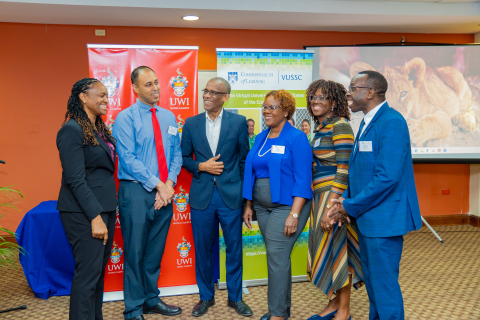
(left to right) Dr. Schontal Moore, Adviser: Virtual University for Small States of the Commonwealth – VUSSC, COL, Mr. Jonathan Archie, Deputy Campus Registrar, The UWI, Mona, Dr. Tomlin Paul, Deputy Principal, The UWI, Mona, Dr. Olivene Burke, Director, Short-Term Advancement and Resource Centre (UWISTAR), Mrs. Debbie Hope, Senior Administrative Assistant, Office of the Deputy Principal, The UWI, Mona and Dr. Evode Mukama, Adviser: Teacher Education, COL share a lighter moment after the event.
A major step towards regional education reform was recently taken at The University of the West Indies (UWI), Mona Campus, in collaboration with the Commonwealth of Learning (COL), when regional leaders convened to develop a shared framework for the recognition and transfer of micro-credentials across the Caribbean and the wider Commonwealth. The initiative seeks to establish a Commonwealth Credit Transfer Framework for Micro-Credentials.
This development represents the latest chapter in the evolution of education and certification in the region — from the General Certificate of Education (GCE), first introduced in the Caribbean in the 1950s, to the establishment of the Caribbean Examinations Council (CXC) in 1972 and the launch of the Caribbean Secondary Education Certificate (CSEC) in 1979. “This is more than an education reform. It's about creating new access points to opportunity for our people and enabling a genuinely Caribbean vision of lifelong, borderless learning. This framework has the potential to unlock mobility, jobs, and lifelong learning across the Caribbean and beyond," said Dr. Tomlin Paul, Deputy Principal of The UWI, Mona.
Caribbean Meeting Lead from COL, Dr. Schontal Moore noted, "COL values this partnership with The University of the West Indies, Mona Campus, as a critical step towards developing a Commonwealth Credit Transfer Framework tailored for micro-credentials in the digital age. Our collaboration is driven by a shared commitment to enhancing qualification mobility and lifelong learning across the Caribbean region. We anticipate that this initiative will advance steps towards enabling education and training institutions to systematically adopt and implement micro-credentialing practices, ultimately empowering learners and addressing regional workforce needs effectively."
The two-day event, hosted at The UWI's Regional Headquarters, brought together stakeholders from 11 countries, including ministries of education, accreditation bodies, universities, and training authorities. Dr. Phylicia Marshall, Assistant Chief Education Officer at Jamaica's Ministry of Education and Commonwealth of Learning Focal Point, emphasised the importance of both structure and relevance. "For micro-credentials to truly benefit the Caribbean, they must be built within a clear and recognised framework that ensures quality, portability, and alignment with national and regional goals. The value of these credentials lies in their relevance. To be meaningful, they must be built in collaboration with employers and aligned to the skills in demand across the region," said Dr. Marshall.
Project lead Dr. Jako Olivier (COL) stated “Micro-credentials have the potential to enable students to stack short-term training opportunities into recognised qualifications and consequently support graduate employability in an increasingly competitive, global, and technology-driven work context. The Commonwealth of Learning has started with a project which aims to develop a common Commonwealth Credit Transfer Framework for Micro-credentials, enhancing the recognition and mobility of qualifications across countries. This consultative regional meeting in Jamaica is one of five key opportunities to gather valuable insights from ministries and stakeholders across Commonwealth nations to shape a more accessible and flexible learning ecosystem.”
Notably, several regional organisations are already shifting towards this new model. The Caribbean Examinations Council (CXC) has recently begun integrating modular learning into its assessment structure.
Dr. Wayne Wesley, Registrar and CEO of CXC, explained, "Micro-credentials offer a way to recognise every learner's progress — not just those who succeed in traditional systems. For too long, our education model has been all or nothing — either you get it, or you don't and sometimes it's not because they haven't achieved, it's because of how we've defined achievement."
He added that CXC's CTEC (Targeted Capacity Education Certificate) micro-qualification initiative allows learners to stack smaller, job-relevant modules into full certification over time, creating more flexible, responsive pathways to achievement.
In the meantime, Dr. Marshall stressed the need to ensure these new opportunities reach the communities that need them most, "The success of micro-credentials will depend on accessibility. By leveraging digital and blended platforms, we can expand reach, especially to underserved communities, and make skill development truly inclusive."
The draft framework will continue to be refined in the coming months, informed by regional input and technical review.

